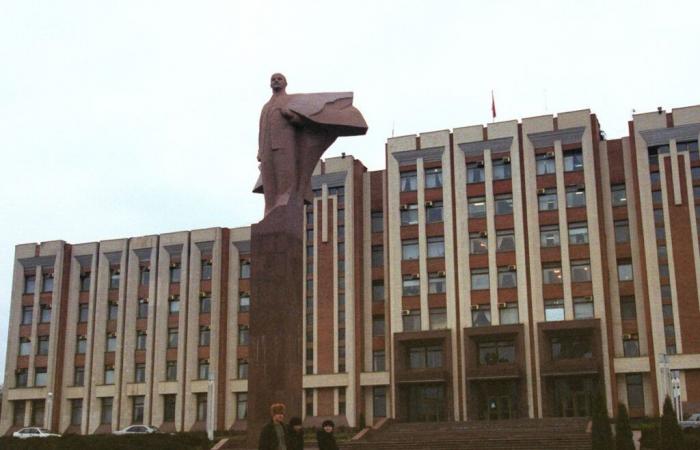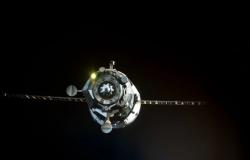Vineyards, woods scorched by autumn, fields, a few very rare villages… But as soon as we pass the border posts between Moldova and Transnistria, a pro-Russian separatist region wedged between the Dniester river and Ukraine, the landscape becomes urban and industrial. No more Romanian language, all signs are now displayed in Russian. After Bender, the second city of the enclave, located on the west bank of the river, one of them indicates two directions: that of Tiraspol, the capital of the ghost state, and Odessa, the third city of ‘Ukraine. A striking geographical reminder: less than 150 kilometers separate the Moldovan separatist region from the “pearl of the Black Sea”.
Here we are in Tiraspol. Along Avenue du 25-Octobre, the city’s main artery, monuments to the glory of Russian wars are lined up: the “great patriotic war” of 1941-1945, the intervention in Afghanistan and, naturally , the heroes of the “Dniester War”: in 1992, this conflict opposed the Transdniestrian separatists to the Moldovans. It left a few hundred dead and ended with a ceasefire after an intervention by the Russian army.
Soviet tank in Tiraspol; Credit: Challenges
The wide Soviet avenues are in good condition, the seat of the “Parliament” is currently being renovated, the parks are full of flowers and well maintained. Walkers stroll along the Dniester, children leaving school run in front of the statue of Lenin. But the calm and dapper facade of this Russian bubble is only a fragile glaze.
Read alsoRussia or European Union: despite the “yes” victory in the referendum, Moldova remains divided
Economic exchanges which shifted towards the west
Because since the Russian invasion of February 24, 2022, nothing is really the same as before. Trade flows, very active with Ukraine, Russia and Belarus, ceased overnight towards the east. The day after its aggression, Ukraine closed its border with the pro-Russian enclave, where 1,500 soldiers of the 14e Russian army including a few hundred officers. But the Transnistrians did not budge. Subject to an authoritarian regime, the ghost state has neither a free press nor a polling institute. It is therefore difficult to know the public opinion of Transnistrians. “Of course there are a few Putin fanatics but most of us know that the Russian president launched this war to stay in power, at the expense of innocent Ukrainian victimswhispers a fifty-year-old we met in Tiraspol. This story of the ‘Russian brothers’ is a fable. » “The elites of Tiraspol wanted to show that they were not aggressiveobserves Iulian Groza, director of the pro-European think tank IPRE. They have no interest in losing their income, which depends 75% on trade with the European Union. »
In fact, economic exchanges have been entirely reoriented towards the European Union and Moldova. Which now controls all trade flows in Transnistria. A lever that the Moldovan authorities are using to – timidly – attempt a first step towards territorial control: since the 1is January 2024, Transnistrian companies must pay taxes to Moldova on their imports from the European Union. “Regional developments are inevitably directing Transnistria towards more concessions with Moldova: the result is strong internal tensions in Tiraspol, between transactional economic elites and political elites dependent on Moscow and its security services”summarizes Florent Parmentier, researcher specializing in Moldova, author of a very comprehensive note on the impact of the Ukrainian conflict on the region.
Could the economy collapse on December 31?
In addition, the approach of a deadline poses a silent threat to Transnistria: on December 31, 2024, the agreement under which Russian gas is transported to the west via a pipeline crossing Ukraine expires. The closure of the gas pipeline poses an existential question to Transnistria: it depends closely on Russian gas. With this energy provided free of charge by Moscow, it produces very competitive steel and resells electricity in Moldova. “Russian gas provides a third of the budget of this pseudo-state and half of its GDP”underlines independent expert Sergiu Tofilat. An economy fragile like a house of cards…
Will Russia stop subsidizing the separatist enclave? “It would lose one of the pillars of its policy of influence”objects political scientist Iulian Groza. Among other options, Russia could continue to transport its gas through Turkey, but at a higher cost. The option of a sudden abandonment of the Kremlin is nevertheless taken into account in Chisinau. Because it would have a way of destabilizing Moldova, by plunging 340,000 people on its borders into a serious humanitarian and social crisis. And so as not to give Russian-speaking populations the feeling of being abandoned by Moscow, Russian propaganda could even make the small EU candidate country responsible for a “genocide”. “I said publicly that Moldova would not obstruct the delivery of gas and asked Gazprom to shed light on its supplies”explains to Challenges Energy Minister Victor Parlicov.
Read alsoWhy we shouldn’t forget Moldova
In the medium term, will the small ghost state end up moving towards the west by gradually attaching itself to Moldova, which has created a “ministry of reintegration” or could it be annexed to Russia? Its fate depends closely on the military situation in Ukraine, underlines Florent Parmentier.
In the meantime, the pro-Russian region serves as a rear base for Russia for its hybrid attacks against Moldova. In the run-up to the double vote organized at the end of October in Moldova – a presidential election and a referendum on the European Union – a system of massive vote buying for pro-Russian candidates was put in place with the complicity of the Kremlin. Paid into the accounts of a Russian bank, the money of the bribed Moldovans was withdrawn in Transnistria – where Russian banks escape European sanctions. Propaganda and vote buying were, however, not enough to prevent the re-election of Maia Sandu, the pro-European president of Moldova: on November 3, she was elected with 55% of the votes, inflicting a setback on the Kremlin. Determined to bring her country into the European Union, she has repeatedly said that the reintegration of Transnistria would not be an obstacle to Moldova’s entry into Europe.






